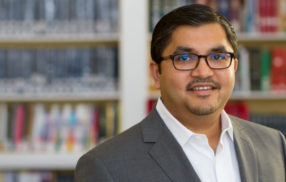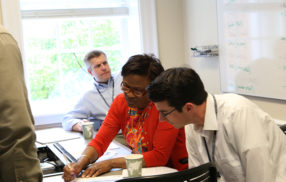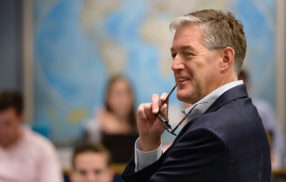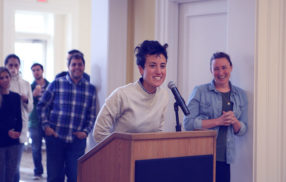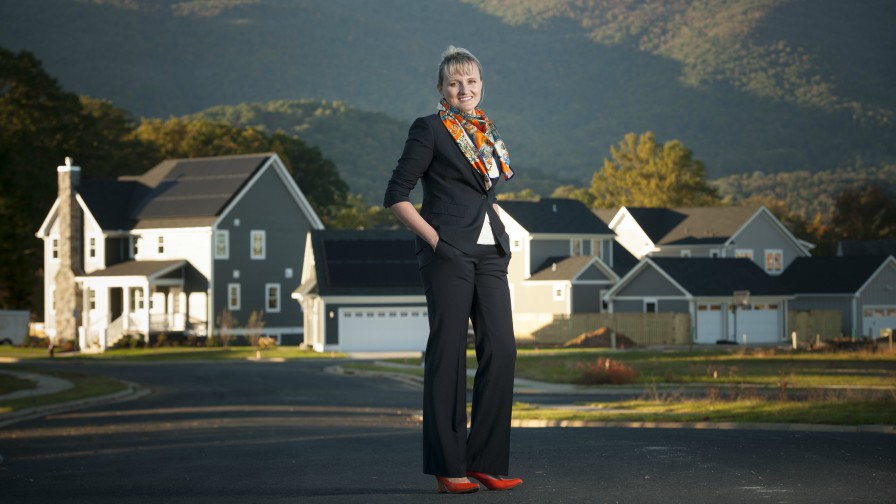
Hard Work and Dedication Carry UVA Darden’s Loutskina to Success in Classroom, Research
By Simon Constable
It may be hard for some people to remember back to 2006 when the housing boom was still in full swing. But University of Virginia Darden School of Business Professor Elena Loutskina certainly won’t forget it in a hurry. In hindsight, that year now looks pivotal to her career, although at the time what happened probably resembled a bad-news-good-news situation.
The less-than-good news arrived as a rejection letter from the editor of an academic journal regarding her recent submission of a research paper that highlighted some potential problems with what was known as “mortgage securitization.” It was a topic barely discussed outside the world of high finance.
The gist of the letter from the editor was simple: “No one is interested in this topic. It’s boring,” the Belarusian-born professor of finance says.
Her piece highlighted a potential problem in the banking system. In the simplest terms, the securitization, which involved the sale of home loans or mortgages to investors, would ultimately reduce the power of the Federal Reserve to conduct monetary policy.
While the editor may have been correct that in 2006 few would be interested in such a topic, since the financial crisis of 2008–09 every central bank policymaker quickly became an ardent student of the very matter that Loutskina highlighted in the rejected paper. Indeed, the difficulty the Fed had in stimulating the economy after the Great Recession stands as a testament to her foresight on the matter.
Even before the housing boom, Loutskina had long been interested in how central banks influence the economy. It all started when she took a job at the Central Bank of Belarus as a software developer after graduating in the late 1990s.
“I’m a beneficiary of the Soviet science education system,” she says. She can boast a bachelor’s degree in mathematical economics and a master’s in applied math in economics, both from the Belarus State University in Minsk. Her education prepared her well for the job at the central bank, which involved creating a new software that helped banks to make or get overnight loans. “Quickly, I knew more than my colleagues, and I realized that I needed to know even more than that,” she says.
From Minsk, she moved to the U.S. and eventually studied for a Ph.D. at Boston College, where she continued to pursue her banking interests.
“I noticed right away that she had a lot of oomph,” says Philip Strahan, professor of finance at Boston College’s Carroll School of Management, who supervised Loutskina’s doctoral studies. “She’s very strong with lots of self-confidence.”
The two finance experts have already worked on four research papers together and are now developing a fifth, he says. “She isn’t an easy co-author, but that is good because you want someone who will tell you when you are writing something stupid,” he says, pointing out that many students tend to defer to a supervisor. In other words, Loutskina’s confidence and willingness to speak up was a significant asset not only for herself but also for her Ph.D. supervisor.
In 2006, the same year her paper got rejected, she got a double-dose of good news. Not only was she awarded her Ph.D. in finance, but she was appointed to the finance faculty at Darden. It was here at the School for the first time that she found herself teaching graduate students.
“In front of me, I found this amazing set of people who were, and are, willing to share their experiences, and I can grow with them,” she says, contrasting that with teaching undergraduates. She says it took her about three years to acclimate to the new classroom environment, but that hasn’t stopped her from earning four successive years of top decile teaching ratings and an “outstanding faculty award.”
Part of her appeal to the students is her blunt approach.
“Elena is direct, which means you do not need to read between the lines to see how you are doing,” says Chris Blankenship (MBA ’17), who now works at a New York-based investment bank. “She will praise you for your success and call you out if you try to take shortcuts.”
Like all Darden faculty, she wants to stretch students intellectually and enjoys teaching. “The only thing I am paid for is grading; the other stuff I do because I love it, out of the goodness of my heart,” says Loutskina. “Teaching at Darden has been one of the most rewarding experiences of my professional life.”
Of course, there is more to Loutskina than work. In Virginia, she started a family. In 2006, 12 years ago, she and her then-boyfriend Andrei Znachonok, a Belarusian software engineer, both moved from Boston. Now, they have two sons. “I just felt at home in Virginia, and it felt right.”
It apparently felt right to Darden’s faculty leadership as well. She earned tenure in 2014, less than a decade after joining the School.
“She is part of a wave of faculty joining Darden, who represent the growth of women and more international faculty and who are devoted to serious, outstanding scholarship,” says Dean Emeritus Bob Bruner. “Elena and her colleagues give the Darden School a serious claim to global stature.”
The University of Virginia Darden School of Business prepares responsible global leaders through unparalleled transformational learning experiences. Darden’s graduate degree programs (MBA, MSBA and Ph.D.) and Executive Education & Lifelong Learning programs offered by the Darden School Foundation set the stage for a lifetime of career advancement and impact. Darden’s top-ranked faculty, renowned for teaching excellence, inspires and shapes modern business leadership worldwide through research, thought leadership and business publishing. Darden has Grounds in Charlottesville, Virginia, and the Washington, D.C., area and a global community that includes 18,000 alumni in 90 countries. Darden was established in 1955 at the University of Virginia, a top public university founded by Thomas Jefferson in 1819 in Charlottesville, Virginia.
Press Contact
Molly Mitchell
Senior Associate Director, Editorial and Media Relations
Darden School of Business
University of Virginia
MitchellM@darden.virginia.edu





